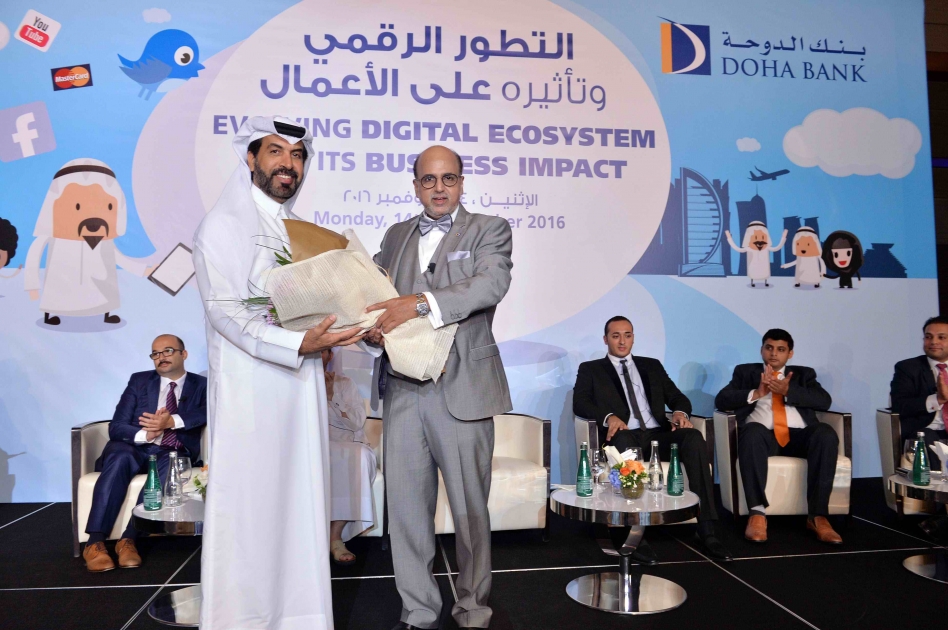
Digital Transformation Can Create New Business Models
Doha Bank hosted a conference “Evolving Digital ecosystem and its Business impact” on 14th November 2016 at Westin Hotel Grand Ball room. The event was attended by Chief Guest Mr. Rashid Ali Al-Mansoori, CEO of Qatar Stock Exchange & Board Member and Senior Management staff from leading corporates and from major banks in Qatar.
Dr. R. Seetharaman CEO of Doha Bank gave insight on Global scenario. He said “The recent IMF outlook had given global growth of 3.1 percent in 2016. A more subdued outlook for advanced economies following the June U.K. vote in favor of leaving the European Union and weaker-than-expected growth in the United States. As a result, the 2016 growth forecast for advanced economies has been marked down to 1.6 percent. Emerging and developing economies expected to grow by 4.2 percent this year. With Global growth still struggling to accelerate, innovations in technology can act as an enabler of growth. Digital eco system is significantly more than digital banking, it takes a holistic view of the customer. The connectivity between various service providers is lot more in a “digital eco system” than in a digital banking environment. The Business models also need to transform themselves to explore the benefits of a digital eco-system. Digital transformation will lead to creation of new Business Models.” The impact of digital transformation has resulted in significant erosion in the size of Music, Trading, Retail and Advertising industry globally. As per Oracle, the Music, Trading, and Advertising the size has eroded by 46%, 72% and 74% respectively when compared from 2000-14. The Retail market has grown online from 0.09% in 2000 to 5.8% in 2013.
Dr. R. Seetharaman highlighted on how banks should approach customers on the digital space. He said “Exploring and uncovering multiple channels of communication to customers and other banking partners will be critical for GCC banking industry growth. GCC Banks should invest wisely to understand customer analytics, as this can help derive efficient channels. As digitization of all industries continues, consumers will expect banking experiences to replicate those in other industries. With significantly fewer visits to a local branch office or even a phone call to a customer service representative, conveying a consistent brand experience will be more challenging. Brand equity in the GCC Banking industry will also increasingly flow from partnerships that are established with others in the ecosystem. Service differentiation and customer experience will increasingly become the major deciding factors, with the ability to deliver real-time insights and offers, transparency and integrated commerce opportunities becoming more important. The banks which start listening closer to their customers’ needs will have a competitive advantage over others.” Mr. Mahmoud Raef, Country Manager, Payfort Qatar spoke on online payment changing landscapes, he gave insights on market size and outlook of online payment industry in Middle East region. Mr. Gaurang Shah, Digital Payments Lead – Middle East and Africa, Master Card spoke on new payment solutions. He spoke on changing consumer behavior and its effect on payment landscape. Mr. Onur Ozan, Country Manager UAE/Turkey/Iran, Swift spoke on Cross Border payments outlook. Mr. Gul Khan, Head of Retail Banking, Doha Bank spoke on changing consumer behavior in Digital World.
Dr.R.Seetharaman gave insight on GCC Fintech industry. He said “There has been little investment in the GCC Fintech industry, but this is expected to change in the coming years. GCC governments can play the role of a facilitator in terms of policy and regulation, and in providing the right environment for innovation to flourish to enable private sector to come up with solutions. Cash has always reigned supreme in the Middle East, even after the advent of plastic, net banking and other alternative payment systems. But with the increase in internet and smartphone penetration, digital payment systems are gaining prominence in the region. GCC Banks are allocating resources to adapt their business models to the fintech revolution as they run the risk of losing market shares to technology innovators.”
Dr.R.Seetharaman highlighted on challenges in digital space. He said “Banks and the financial regulators should address the trade-off between convenience and security when it comes to digital banking. The telecommunications players are providing more digital services through their data plans which is resulting in higher revenue growth. From compliance perspective banks and the regulators have to deal with questions arising from digital banking. To protect customers, thwart organized criminals, and ensure financial stability, prudential and conduct regulators, and legislators, need to ensure that regulation is future-proofed for the digital age.”


























